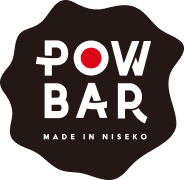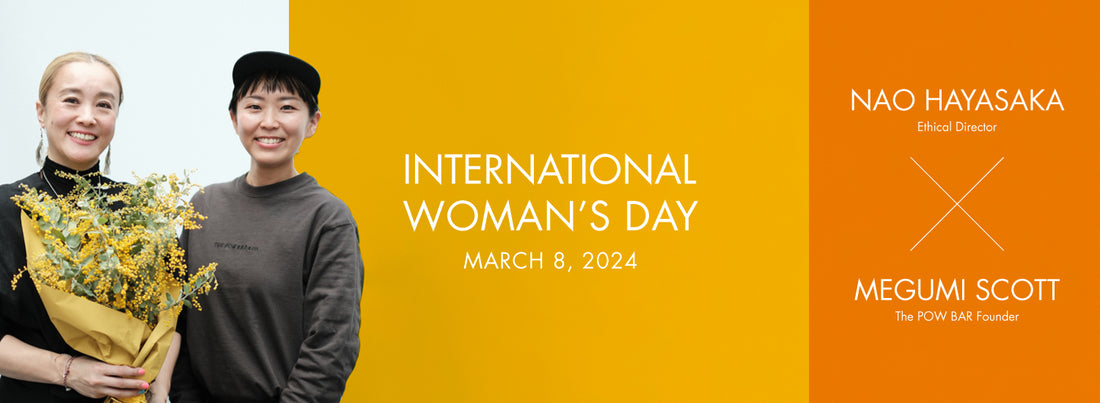Learn about the issues, think about them, and act towards a gender-equal future
The action we took based on our own thinking was to "have a dialogue"
Scott Ai, founder of The POW BAR, invited Nao Hayasaka, who works as an ethical director, to talk about gender issues surrounding our modern society.
------
The culture that says "women should be like this" suppresses the "individual"
Megumi Scott (hereinafter Meg): I think there are many people who don't question it. As education is like that, if you are raised from a young age to be told "women should be like this" or "because you're a girl, you should wear red clothes instead of blue," it becomes normal. It would be nice if you could realize something at some point, but it's not that easy. Rather than "how women should be" or "how men should be," I think it's important to recognize your individuality and ask "what do you want to do?"
Nao Hayasaka (hereinafter Hayasaka): Only women can give birth, and men's role is to hunt and get food. It's not like the Jomon period, but biologically there is some division of roles between men and women, and it somehow seems to have taken the form of "men work outside, and women stay inside and take care of the home," but that doesn't fit with today's world, and people are thinking, "Hmm, isn't that strange?"
In various parts of Asia that I have visited recently , there are many tin-roofed kiosk-like shops lined up, and the men there sleep on their bellies in front of the shops, while the women are seen working energetically. But the women don't complain, they just do what they are, and value individuality. I felt the values or energy of such developing countries.
Meg: When the individual is suppressed and one has to endure and live, one ends up forcing that onto others in the same way. "I'm enduring it, so you have to endure it too. Why is that person so free?" I wonder if that kind of mentality is still present in Japanese society today. If you are raised with such values from a young age, it will have an impact even after you become an adult, and you will inevitably find it difficult to live in the "age of the individual" where anyone can freely express their opinions and act.
Everyone should recognize and be supported as an individual.
It is important to understand the differences between the sexes and accept each other
Meg: I've heard that in Scandinavian countries, instead of dividing workplaces equally between men and women, they give equal rights and opportunities when choosing a job, and that this naturally results in an unequal ratio of men and women in the workplace. In other words, there are more men in manual labor, and more women in nursing and other workplaces that require care. It's not a matter of numbers, such as "half the workforce must be women," but rather it's important to give equal rights and opportunities, and for the government and society to understand this.
I think that such fundamental biological frameworks within the broad category of gender differences are the basis, and then there is the person's personality and will. In order to aim for a society where people can shine as they are, regardless of gender, it is important that everyone recognizes and supports their individuality . For example, we may need more social mechanisms such as parental leave for men and a system that allows both men and women to share housework comfortably.
Hayasaka: I think it's important for men to understand that there are things like men's period pains that are biologically unavoidable, and that, after understanding men, we should mutually acknowledge how we should work and live.
Girls start menstruating in the upper grades of elementary school, and I'm sure there are many girls who have experienced being teased by boys about it. Because of this situation, it is difficult for them to understand the differences between the sexes, which should not be hidden. Menstruation is something embarrassing and is hidden, and I never even noticed when my mother was on her period, and we have come this far without a clear understanding of the differences between men and women at the sex education level.
If we get down to the root of it, we may need to start by rethinking sex education. If we can get off to a good start there, I think we can cultivate a more tolerant and accepting mindset that is more accepting of others and genderlessness.
Support that only women can provide
Hayasaka: The basis of my work as an ethical director is my experience working at a company that made cloth napkins, an item unique to women. One of the goals was to reduce waste, but my encounter with organic cotton and using cloth napkins also gave me the opportunity to learn more about my own body, and it also gave me the opportunity to rethink what I eat and my values.
It was around that time that my daughter started her period, and as I started using cloth napkins, she naturally started using them too. I feel that it was a big thing for me as a parent to be able to support the changes in my daughter's body.
Meg: I'm a woman, and I don't have as much physical strength or muscle power as men. I wanted to enjoy mountain climbing and outdoor sports, which I was crazy about at the time, to the fullest, so I started developing energy bars to make up for that.
By adjusting your lifestyle and changing your diet, you should be able to manage things that may be perceived as disadvantages unique to women, such as physical strength and menstrual pain . Rather than forcing ourselves to turn a blind eye to gender differences, we want to effectively support issues unique to women . I would be very happy if women who change their diet feel a difference in their bodies or become more positive feel that way through The POW BAR .
Nao Hayasaka
Ethical Director, NEW NERGY CURATOR
Originally from Tsuruoka City, Yamagata Prefecture. A working mother with a daughter of Generation Z. Her family runs a liquor and food company that has been in business for 110 years in Tsuruoka, a UNESCO Creative City of Gastronomy. After working in PR for a major apparel company and as a director for a cloth sanitary napkin specialty store for women, she joined the ethical division of HPFRANCE in 2019. She is the ethical area director of "rooms" and the director and buyer of "Ethical Convenience Store". She is currently the curator of the creative festival "NEW ENERGY", directs projects for brands, companies and local governments related to sustainability and ethics, and plans product development, workshops, seminars and PR. She is currently preparing her own brand, "THE ETHNOBOTANY OF EDEN".
Megumi Scott
Founder of The POW BAR
Born in Koshimizu-cho, Shari-gun, Hokkaido. From an early age, her father took her to mountain climbing. After working for an outdoor equipment manufacturer for six years, she started the food brand BIOLIFE LAB. She is involved in the development of energy bars, catering, and pop-up shops and events for vegan baked goods. In 2019, she launched The POW BAR, an energy bar brand developed based on her own experiences. At the same time, she opened The POW BAR cafe, contributing to the revitalization of the local area as a place where people can casually experience the brand concept. She is the mother of one child.

